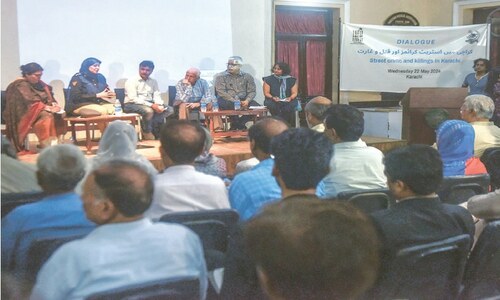KARACHI: A study by Aga Khan University researchers has suggested ways to reduce burden of a leading cause of maternal deaths and disease in Pakistan, pre-eclampsia, a pregnancy-related disorder linked to high blood pressure.
Up to a quarter of all deaths of pregnant women in the country are caused by high blood pressure. Yet, there is little awareness among the public and some healthcare providers of the importance of monitoring blood pressure as part of antenatal care practices.
“There is no word for pre-eclampsia in prominent regional languages like Sindhi,” says Dr Rahat Qureshi, the study’s co-principal investigator in Pakistan and Associate Professor at Aga Khan University. “Unlike other childbirth complications, signs of pre-eclampsia cannot be identified easily which limits the chances of early detection and leaves many pregnant women vulnerable to its dangerous complications.”
The findings of the Community-Level Interventions for Pre-eclampsia (CLIP) Pakistan study published in The Lancet suggest that community health workers can play an important role in tackling delays in triaging women, providing initial treatment and in ensuring transport to a health facility.
The study saw lady health workers (LHWs) in Matiari and Hyderabad visit over 35,000 women over a three-year period.
LHWs asked mothers about a variety of symptoms related to pre-eclampsia and also measured their blood pressure and oxygen saturation levels on the spot. This information was then entered into a smartphone-based mobile health application allowing a quick assessment of the risk of severe pre-eclampsia.
If warnings signs were noted, LHWs were trained to provide prompt treatment by providing anti-hypertensive tablets and/or by administering magnesium sulfate. They also provided awareness of antenatal care seeking and birth preparedness during pregnancy and referred at-risk mothers to nearby hospitals.
The trial demonstrates that LHWs can use technology to provide accurate referral advice to communities within their homes. The analysis shows that when there were enough LHWs to provide care, there were fewer deaths of mothers, fewer stillbirths and fewer deaths of newborns.
The number of LHWs should be sufficient to ensure at least eight antenatal care visits to help reduce risk of adverse pregnancy outcomes, researchers added.
Findings also support the World Health Organization’s recommendation of the benefits of regular antenatal visits to lower the risk of pregnancy-related complications.
Researchers also noted that improvements are needed in the quality of care offered at facilities and the availability of key commodities in order to reduce the incidence of women dying during their pregnancy or immediately after giving birth.
Published in Dawn, August 24th, 2020














































Dear visitor, the comments section is undergoing an overhaul and will return soon.